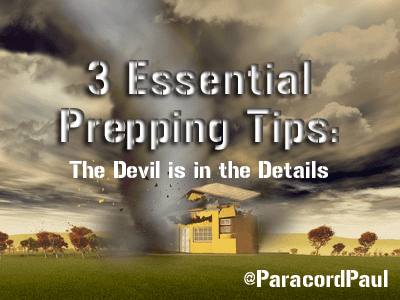3 Essential Prepping Tips: The Devil is in the Details

As many of us begin to prepare for what may lay ahead, it is essential not to forget about the little things. Most of us concentrate on travel/escape routes, practice vital conservation techniques, hone hunting and security skills, stockpile food and water, etc.
But we must remember, the Devil is in the details…
We were hit with an F1 tornado a while back. We lost parts of our roof, trees, and flag pole (we miss that), and some of our cedar fencings imploded. We were lucky, though — some neighbors lost their roofs, and entire outbuildings disappeared. We didn’t have power back until late on Christmas Eve — thank God for generators. (If you don’t have one, get one. You never want to be in the position of having to get a generator after the fact. The stores will be sold out.)
Here are some quick prepping tips we talked about that I wanted to share to help you deal with what we today may consider daily annoyances, but during a disaster, maybe your ultimate downfall.
- Infestation: Just the sound of that word gives me the creeps! In day-to-day life, we all have to deal with the occasional house mouse or buggy annoyance. In a disaster scenario where you lose walls, roofs, or doors — in come rodents or other types of pest infestations can spell trouble. Rodents can carry diseases.
After spending all that time preparing your food stockpile, it would be truly disheartening to learn these pesky creatures ate their way through a bag of your grain; furthermore, leaving a trail of germs and disease-carrying excrement behind to contaminate your supplies. It is essential to protect your stockpile by placing traps in strategic places and sealing certain goods in containers critters cannot get into. - Supplies destroyed due to poor containment: Strong containers can not only stop mice, but some can also hold up to a barrage of environmental abuse. The problem with a natural disaster is it attacks from many different fronts; it could be wind, floods, fire — or all of the above.
You must use containers that can withstand whatever the environment can throw at you. Employing the use of fire and waterproof containers is essential to you and your family’s survival. These types of containers will be your first line of defense during a natural disaster. - What have you to share or trade? Barter may be the only currency in a post-disaster environment. There were a lot of neighbors without water, gas, and basics. Of course, we didn’t hesitate to help out, but that is what got us thinking. Honing your skills with barter as well as organizing a plan for developing useful items for trade, may help you and your family acquire essentials you are lacking in your supply or have simply used up.
Think comfort items, such as tobacco, alcohol, batteries, toilet paper soap, alcohol, tobacco (yeah, I know I mentioned the last two twice, but you’ll probably want some for yourself too — disasters suck), etc. Most of these products you can easily stockpile.
After our little disaster — we looked at it as a test run. When making your list of necessary items, remember to take into account each possibility for failure and the tiniest details. These types of preparations can make a huge difference after the disaster hits in regard to your comfort level and dealing with the aftermath.
Oh, yeah, don’t forget a deck of cards. We drank some of that alcohol and played gin-rummy the night the storm hit, knowing it was not safe to go out until daybreak. Helped alleviate some of the stress; well, not all of it, but after a couple of rounds, you really won’t be as worried!
